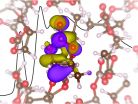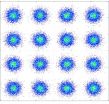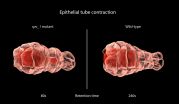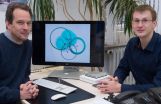Technophobia may keep seniors from using apps to manage diabetes
2014-12-19
(Press-News.org) Despite showing interest in web or mobile apps to help manage their Type 2 diabetes, only a small number of older adults actually use them, says a new study from the University of Waterloo. Approximately 2.2 million Canadians are living with Type 2 diabetes, 2 million of whom are age 50 or older.
The study, which appears in the online edition of the Journal of Diabetes Science and Technology, found that although more than 90 per cent of research participants owned a computer or had daily Internet access, just 18 per cent used applications on this technology to help manage their diabetes. While almost half owned smartphones, only 5 per cent used them to manage their disease.
"There was a strong association between age and confidence--confidence about technology use really dropped off in the oldest age groups," said Professor Peter Hall, of the Faculty of Applied Health Sciences at Waterloo and senior author of the paper. "This drop in confidence was mirrored by a corresponding drop in intentions to use the technology in the near future."
Earlier research shows that people who use smartphone and web apps to manage chronic diseases follow their doctors' recommendations more closely and make positive changes in their health, at least among those already positively inclined toward such technology. In diabetes management, technology can provide platforms for glucose logs, dietary and physical activity journals, and create opportunities for scheduled prompting or interventions.
"It may be that older adults are unaware of apps available, they had low confidence about using them regularly, or both," said Kathleen Dobson, a graduate student and lead author on the paper.
Despite the low use of assistive technology among older adults, the majority of study participants felt that adopting Internet or smartphone applications to manage their diabetes was a good idea. More than two-thirds intended to adopt assistive technology moving forward.
"Successful diabetes management improves quality of life, reduces risk of complications and generally extends life expectancy," said Professor Hall. "My hope is that we can find ways to encourage adoption of these new self-management tools, even among those older adults who don't consider themselves to be especially tech-savvy."
The development of senior-friendly apps that are easier to see and use along with encouragement from health-care practitioners to use assistive technology could help increase the number of older adults who use their phones and computers as tools to better manage their diabetes. Raising awareness about existing applications and boosting confidence is also key in increasing the use of assistive technology among older adults.
A future phase of this research will involve seniors who aren't tech-savvy to determine their receptivity to different types of applications.
INFORMATION:
ELSE PRESS RELEASES FROM THIS DATE:
2014-12-19
The lithium-ion batteries that mobilize our electronic devices need to be improved if they are to power electric vehicles or
store electrical energy for the grid. Berkeley Lab researchers looking for a better understanding of liquid electrolyte may have found a pathway forward. A team led by Richard Saykally, a chemist with Berkeley Lab's Chemical Sciences Division, David Prendergast, a theorist with Berkeley Lab's Molecular Foundry, and Steven Harris, a chemist with the Lab's Materials Sciences Division, found surprising results in the first X-ray absorption spectroscopy ...
2014-12-19
It's like a scene from a gamer's wildest dreams: 12 high-definition, 55-inch 3D televisions all connected to a computer capable of supporting high-end, graphics-intensive gaming.
On the massive screen, images are controlled by a Wii remote that interacts with a Kinnect-like Bluetooth device (called SmartTrack), while 3D glasses worn by the user create dizzying added dimensions.
But this real-life, computer-powered mega TV is not for gaming. It's for engineering.
Welcome to Brigham Young University's VuePod, a 3D immersive visualization environment run by BYU's Department ...
2014-12-19
New research indicates that reducing emergency surgery for three common procedures by 10 percent could cut $1 billion in health care costs over 10 years.
As hospitals and health systems increasingly focus on addressing the rising cost of health care in the United States, and with the expense of surgical care playing a major role, physician researchers and others across the healthcare industry are working to identify innovative ways to reduce surgical costs.
In new findings published online in the journal Annals of Surgery on December 19, 2014, researchers determined ...
2014-12-19
Researchers from the University of Southampton have revealed a breakthrough in optical fibre communications.
Academics from the University's Optoelectronics Research Centre (ORC) have collaborated with colleagues at Eblana Photonics Inc, in Ireland, to develop an approach that enables direct modulation of laser currents to be used to generate highly advanced modulation format signals.
The research, published in the journal Nature Communications, explores a radically new approach to the generation of spectrally-efficient advanced modulation format signals as required ...
2014-12-19
Carnivorous plants catch and digest tiny animals in order and derive benefits for their nutrition. Interestingly the trend towards vegetarianism seems to overcome carnivorous plants as well. The aquatic carnivorous bladderwort, which can be found in many lakes and ponds worldwide, does not only gain profit from eating little animals but also by consuming algae and pollen grains. This results in survival in aquatic habitats where prey animals are rare, and in increased fitness if the animals and algae are caught in a well-balanced diet. An Austrian research group around ...
2014-12-19
Researchers at the Mechanobiology Institute (MBI), National University of Singapore (NUS) have identified a novel mechanosensitive regulation of epithelial tube contraction. These findings are published on 19 December 2014 in Current Biology (Pei Yi Tan and Ronen Zaidel-Bar. Transient membrane localization of SPV-1 drives cyclical actomyosin contractions in the C. elegans spermatheca, Current Biology, 19 Dec 2014, doi: 10.1016/j.cub.2014.11.033)
Regulating tube constriction
Many of the fundamental processes of life rely on biological structures known as epithelial ...
2014-12-19
Over the past decade, ocean acidification has received growing recognition not only in the scientific area. Decision-makers, stakeholders, and the general public are becoming increasingly aware of "the other carbon dioxide problem". It is time to reflect on the successes and deficiencies of ocean acidification research and to take a look forward at the challenges the fastest growing field of marine science is facing. In the January issue of the journal Nature Climate Change Ulf Riebesell, professor for Biological Oceanography at GEOMAR Helmholtz Centre for Ocean Research ...
2014-12-19
Bremerhaven/Germany, 18 December 2014. Ingestion of microplastic particles does not mechanically affect marine isopods. This was the result of a study by biologists at the North Sea Office of the Alfred Wegener Institute, Helmholtz Centre for Polar and Marine Research (AWI) that was published recently in the journal Environmental Science and Technology. The study marks the launch of a series of investigations aimed at forming a risk matrix on the sensitivity of different marine species to microplastic pollution.
Uptake of large plastic items by birds and fish may cause ...
2014-12-19
In a recent study from Lund University in Sweden, researchers have used new technology to study extremely fast processes in solar cells. The research results form a concrete step towards more efficient solar cells.
The upper limit for the efficiency of normal solar cells is around 33 per cent. However, researchers now see a possibility to raise that limit to over 40 per cent, thereby significantly improving the potential of this energy source.
The experiments in the present study involved 'juggling' on quantum level with photons, i.e. light particles, and electrons. ...
2014-12-19
In everyday life, the global positioning system (GPS) can be employed to reliably determine the momentary location of one en route to the desired destination. Scientists from the Institute of Physical and Theoretical Chemistry of the University of Bonn have now developed a molecular "GPS" with which the whereabouts of metal ions in enzymes can be reliably determined. Such ions play important roles in all corners of metabolism and synthesis for biological products. The "molecular GPS" is now being featured in the journal Angewandte Chemie.
There would be no life on our ...
LAST 30 PRESS RELEASES:
[Press-News.org] Technophobia may keep seniors from using apps to manage diabetes




